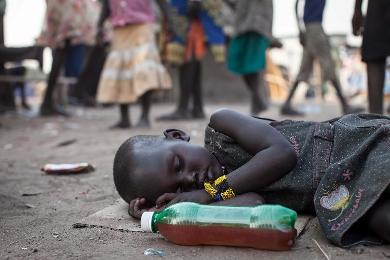Bor businessmen count their losses after conflict
January 31, 2014 (JUBA) – Before the recent conflict, Bor town was developing slowly as the capital of South Sudan’s Jonglei state since the 2005 peace deal with Khartoum ended decades of civil war and led to the country’s independence in 2011.

Royal Junior School was a fast growing private learning centre in Bor that provided nursery and primary classes. It has now been reduced to rubble.
“The school bus is burnt, clinic looted, windows and doors broken for classes,” said Michael Kur, the director and founder of the school.
Kur’s story is one of the many for South Sudanese and foreign nationals who owned businesses in towns that have witnessed the heavy fighting in recent weeks.
The markets of Bentiu, Bor and Malakal have all been destroyed in the intense fighting between the government and rebels loyal to former vice-president Riek Machar.
Sudan Tribune‘s reporter who visited Bor last week witnessed the destruction of shops, hotels and lodges. The entire main market of Marol was burnt to the ground apart from the few permanent buildings.
Kur founded Royal Junior School in 2008 with 87 pupils.
“By the end of November, 2013, we had more than 1,800 pupils in nursery and primary levels,” Kur told Sudan Tribune in Juba, where he took shelter after defectors from the South Sudanese army took control of Bor for the first time in December 18.
Government forces captured Bor on December 25 only for it to be retaken by rebels on December 31. The rebels were forced out of Bor again with the help of Ugandan forces on January 18.
Ayuel Arok, owner of Mzee Hotel and Lodge in Bor, said he could not recognise his building when he visited Bor this week.
“Everything is destroyed”, said Arok.
Arok said he had stocked his hotel with items expecting high sales over the Christmas period but now he has lost everything. He said the losses were incalculable.
“Now, I don’t know where to begin. There is no money and I don’t [know] what the government will do to help business community,” Arok stressed.
Markets were looted by rebels, government forces and local citizens that returned to Bor town have changed hands since the conflict that started in Juba’s Presidential Guard unit on December 15, local residents claim.
Akol Paul Kordit, a member of South Sudan Crisis Committee – a body charged by President Salva Kiir with quickly assessing the situation in the country – told reporters in Bor on a visit there last week that special consideration will be made to help rebuilding the destroyed towns.
Business people who have suffered in the conflict “are not alone”, Kordit said.
“We shall have […] a comprehensive development approach as a national government to address how best these three cities can be made to catch up with the rest of the cities of the Republic of South Sudan”, he said.
Most shops are either burnt or broken into. Asked if they hope for government help, most businessmen are skeptical.
“The ceasefire which was signed did not mention damages caused and we don’t know who will be responsible for the losses incurred” to businesses, Ayuel Arok said.
“My business depends on peace and resettlement of people back to Bor,” said Michael Kur, the owner of Royal Junior School putting his losses at around 300,000 South Sudanese Pounds (around $100,000).
Simon Akuei, the secretary general of South Sudan chamber of commerce said the government has a role to play in reviving the local businesses.
“The business is down and the supply of imports is low,” Akuei said.
“The first step [the government can do] is to convince people that it is safe in South Sudan,” Akuei added.
“I believe that we can still turn it around,” Akuei said when asked if businesses in Bor have the resilience to rise to their feet after the damage caused by more than a month of the conflict.
Local people are beginning to trickle back to deserted towns despite the lack of food and services.
(ST)
